Off the northwest coast of Lombok, Indonesia, lie the Gili Islands, jewels of unmatched natural beauty, nestled inside the blue embrace of the Indian Ocean. These three tiny islets, Gili Trawangan, Gili Air, and Gili Meno, are well-known for their immaculate beaches, abundant marine life, and fascinating underwater landscapes.
Adventurers and diving aficionados from all over the world are drawn to these islands to explore their fascinating depths. Beneath the glistening waves that lap against their coasts is a world of wonder, full of underwater treasures waiting to be discovered around every corner and a plethora of colourful coral reefs teeming with marine life. Take a dive and discover the fascinating dive sites that make the Gili Islands a haven for divers looking for one-of-a-kind experiences deep within the Indonesian archipelago.
We give you an overview of our diving sites:
South Gili Air
Max depth 18m
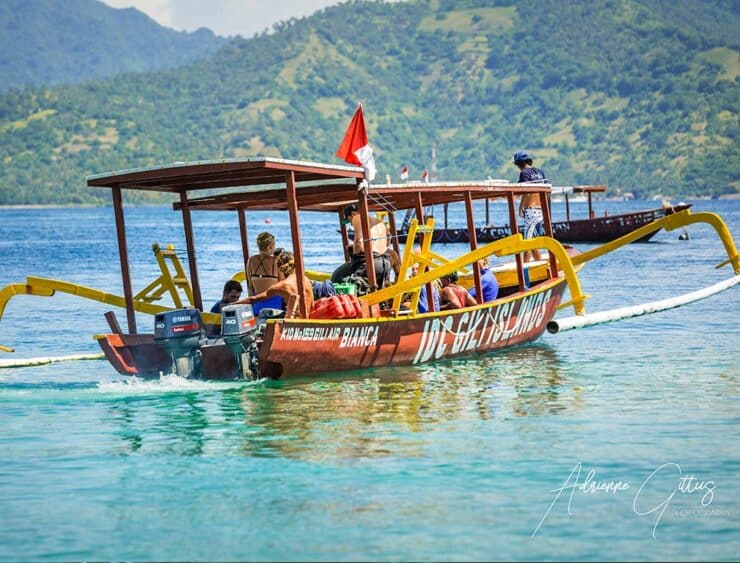
The Oceans 5 House Reef, which has a sandy bottom and a drop of 18 metres, is just a short distance from the dive shop. The reef is centred on a huge pinnacle. Seahorses, razor fish, crocodile fish, and other nudibranch species can be found on the house reef. An ideal location for novice divers and shallow dives.
East Gili Meno
Max depth 30m
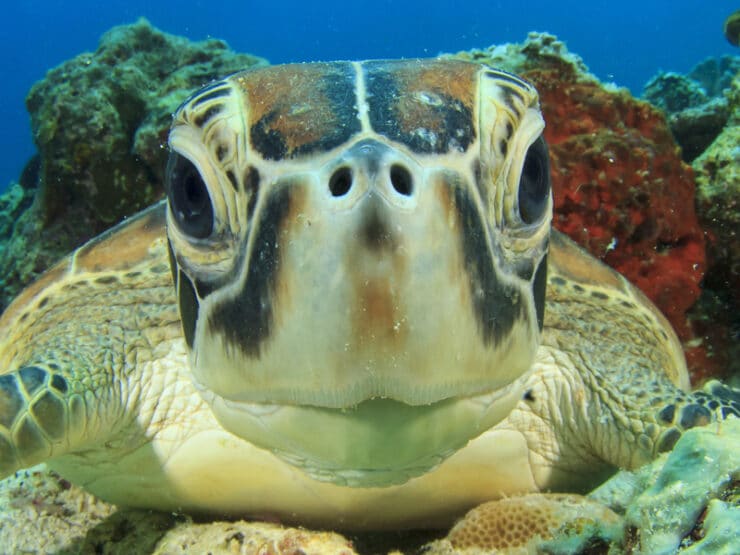
The best place to watch turtles is Turtle Heaven, which is accessible by a quick boat ride to Gili Meno’s eastern shore. One of the dive sites that features a shallow entry and a slope that accommodates divers of all skill levels. While some choose to dive deep, others can glide down the slope in the direction of a sizable pinnacle where there are many of fish to see. There are clownfish present, and big lionfish have been regularly sighted all over the place. Our customers love the dive site Turtle Heaven because of the variety and quantity of marine life there.
North-East Gili Air
Max depth 18m
From Gili Air’s northernmost point, a lengthy slope descends to the harbour. It’s common to see boxfish, frog fish, octopus, ribbon eels, and lion fish here. The Gili Air BioRock may also be seen sliding down the slope. There are now a wide variety of fish and corals living on this artificial reef, which was constructed to encourage the marine life on the island.
North-East Gili Air
Max depth 24m
For those who are interested in taking macro photos or would like to see some of the smaller, more unusual critters that may be found here, this location off the east coast of Gili Air offers a fantastic opportunity. This is a common place to see frog fish, leaf scorpion fish, sea horses, ribbon eels, black-spotted morays, pipe fish and a variety of prawns.
North Gili Air
Max depth 28m
Deep dive site on the northern tip of Gili Air. The site consists of three pinnacles and houses batfish, a beautiful variety of corals and some of the larger species of fish. Macro photographers praise the site for the colorful pictures that can be taken here.
West Gili Air
Max depth 30m
Between Gili Air and Gili Meno, there is a wall that descends from 8 metres to 30 metres. This dive site is home to blue-spotted stingrays, turtles, and pygmy seahorses. This location is unique from all others due to the wall’s topography.
North East of Gili Air
Max depth 30m
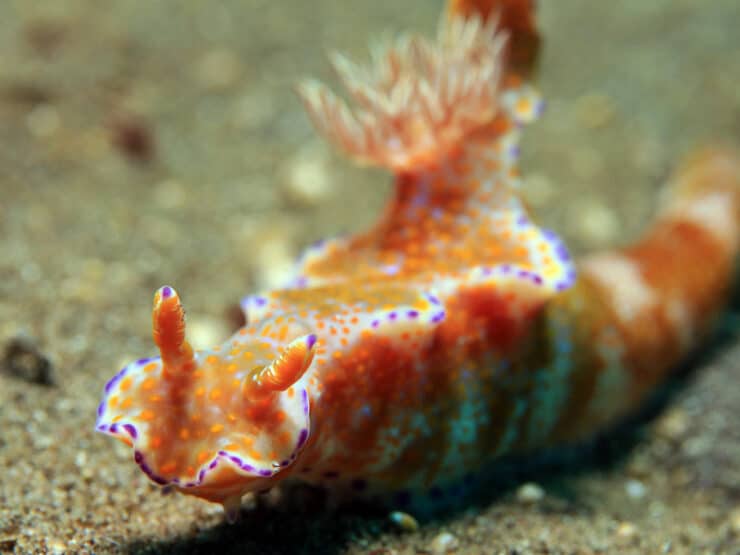
Blue nudibranchs, yellow nudibranchs, red and white nudibranchs and brown nudibranchs with white spikes… Nudibranch Heaven has earned its name by hosting many different types of nudibranchs in all colors and varieties. Colorful reef fish such as angelfish, surgeon fish and clownfish are also frequently spotted here, and so are ribbon eels, mantis shrimps and squid.
Between Gili Meno and Gili Air
Max depth 25m
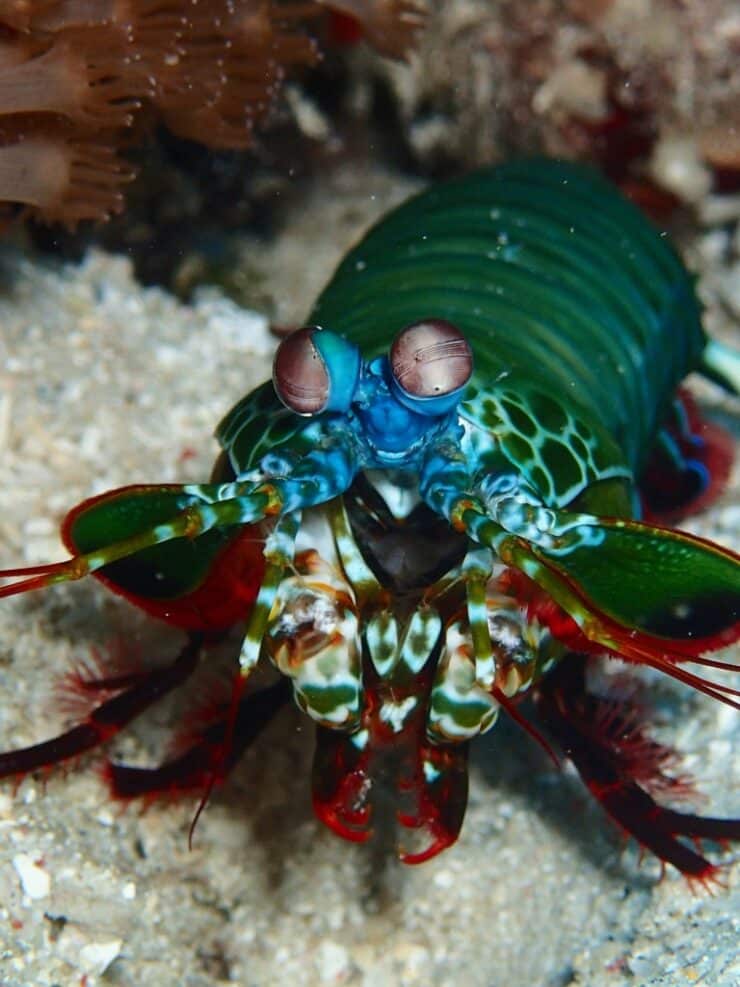
This open water dive site is located between Gili Meno and Gili Air, and it is made up of two long coral ridges that stretch east to west. Due to the largely unspoiled corals on this reef, a variety of coral fish can be seen diving on the enormous table, staghorn, and gorgonian fans that blanket the dive site. Take in the scenery as you float along the reef!
North-West of Gili Meno
Max depth 25m
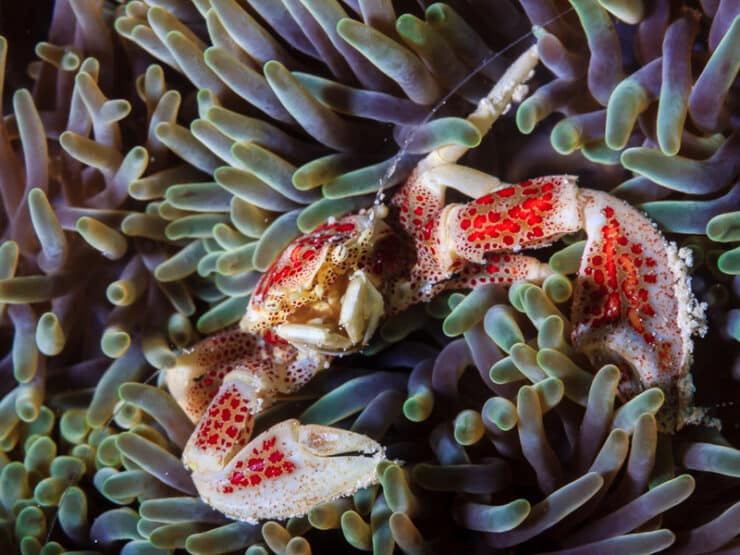
Situated to the west of Gili Meno, this location is ideal for night diving and is home to an abundance of crustaceans. There are two walls: one that is slightly deeper and descends from 5 to 16 metres. Among the various animals visible are Spanish dancers, crabs of all sizes, from tiny coral crabs to enormous sponge crabs, lobsters, prawns, sleeping turtles, young cuttlefish and scorpion fish.
West of Gili Meno
Max depth 20m
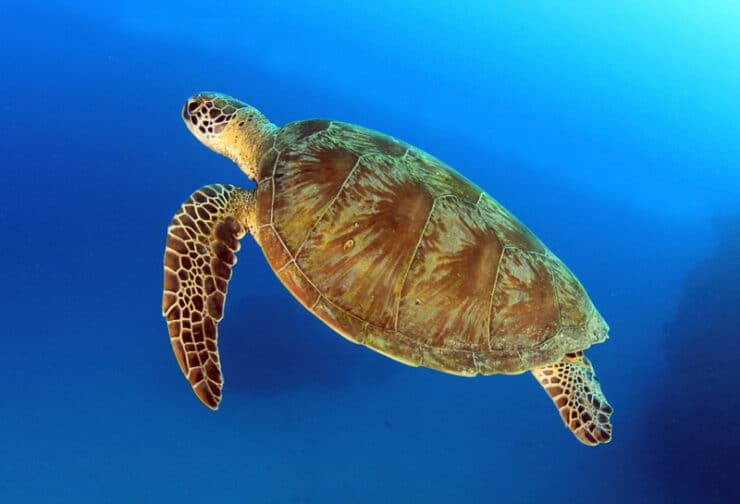
Attention, fans of turtles: Meno Slope is the place to be! The best site to see hawksbill and green sea turtles is on the north coast’s slope. They slumber in between the various coral bommies and feed on the corals. It’s also common to see schools of snapper, puffer fish, and batfish here.
South-West of Gili Meno
Max depth 25m
Situated on Gili Meno’s northern slope is the Bounty Wreck. On Gili Meno, the Bounty was formerly a pontoon that was utilised to construct a jetty. Regretfully, the pontoon sank to the slope due to a massive hole in it, with the lowest point reaching 17 metres and the top being about 6 metres. It has become entirely covered in coral over the years, and a wide variety of species, including sweetlips, frogfish, and scorpion fish, call it home.
North West of Gili Air
Max depth 30m
This deep diving site has many gorges with coral slopes, located just above Gili Meno. Navigate on the reef and swim along the sandy bottom in the cantons. An region that is shallow and level makes for the ideal safety stop situation. The sandy bottom of Takat Malang provides a suitable hiding place for blue-spotted stingrays and garden eels, while vibrant corals with schools of reef fish are among the marine life.
North-East of Gili Meno
Max depth 30m
This is a great deep dive with a great variety of corals that are not seen on the other dive sites. The dive ends on a pinnacle covered in fish life, and the site has a sandy bottom between large sea mounds that range in size and have an interesting variety of overhangs and outcrops. Some of the interesting sand bar formations are similar to desert sand dunes.
North-East of Gili Trawanga
Max depth 30m
A fantastic deep dive with amazing topography, located just east of Gili Trawangan. Large sea mounds are separated by a sandy bottom at a depth of 30 metres. The tallest of these sea mounds extends to a depth of approximately 20 metres, and they have an intriguing array of overhangs and outcrops. The mounds vary in size. A good assortment of corals and several enormous sea fans can be found. The sandy bottom is covered in thousands of garden eels, and visitors can also view barracuda, sharks, and enormous rays.
North-West Gili Trawangan
Max depth 20m
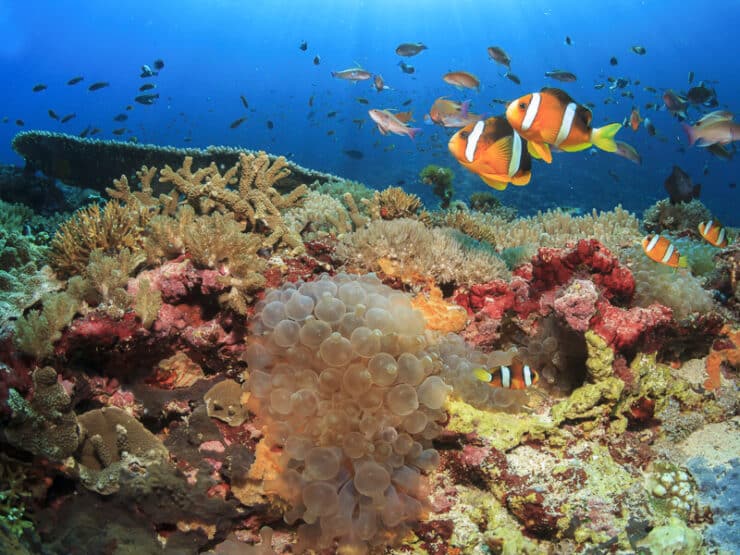
A steep slope with a network of gullies at the bottom that drops from 5 metres to 24 metres on Gili Trawangan’s north side. A great place to dive on multiple levels, with a variety of soft corals in the deeper area giving way to harder corals as you go up, and several turtles that are completely unaffected by divers in the shallows. This location is excellent for drift diving as well. There are 40-meter-deep canyons in the reef’s deeper section for deep divers to explore. Larger marine species, including sharks, trevallys, bumphead parrotfish, and even eagle rays, are regularly sighted in the deepest section of the reef.
West Gili Trawangan
Max depth 30m
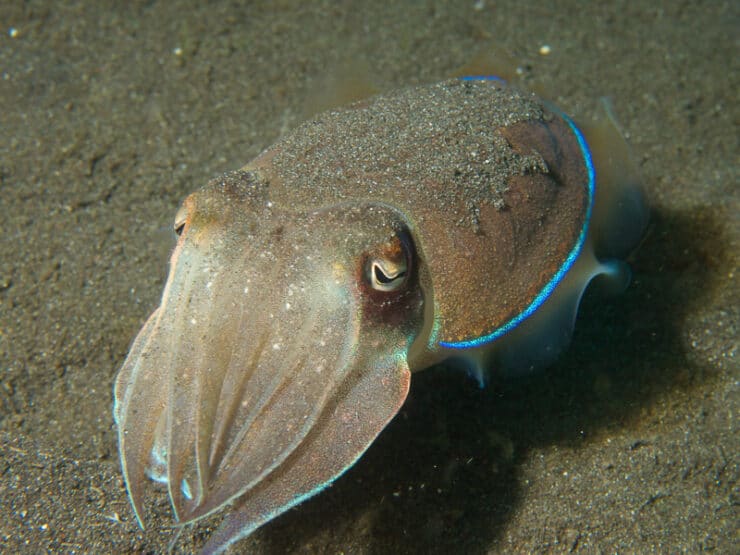
An excellent site for viewing larger marine life on the north side of Gili Trawangan. A flat sandy bottom turns into a series of progressively deeper canyons that run parallel to the shore. This is probably the most popular site because of the sheer variety of life seen here on a single dive. Reef sharks are found basking in the canyons, lobsters, cuttlefish, stingrays, tons of turtles in the shallows. This one of the favorite dive sites of our guests. Especially you can dive also a wreck the “Glenn Nusa”.
South Gili Trawangan
Max depth 22m
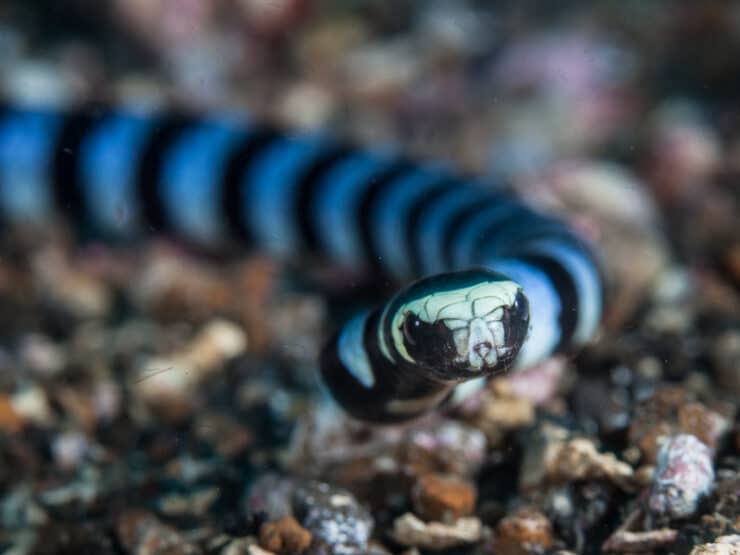
The dive location known as Sunset Reef is situated on the western side of Gili Trawangan and receives cold water inputs from the Lombok Sea Strait. Schools of snappers, gigantic trevallys, black and white tip reef sharks, and sweetlips are among the creatures that frequent the reef. Manta and devil rays are occasionally seen here as well on this dive site. Reef fish and turtles have a safe sanctuary created by staghorn corals in the shallower section of the reef.